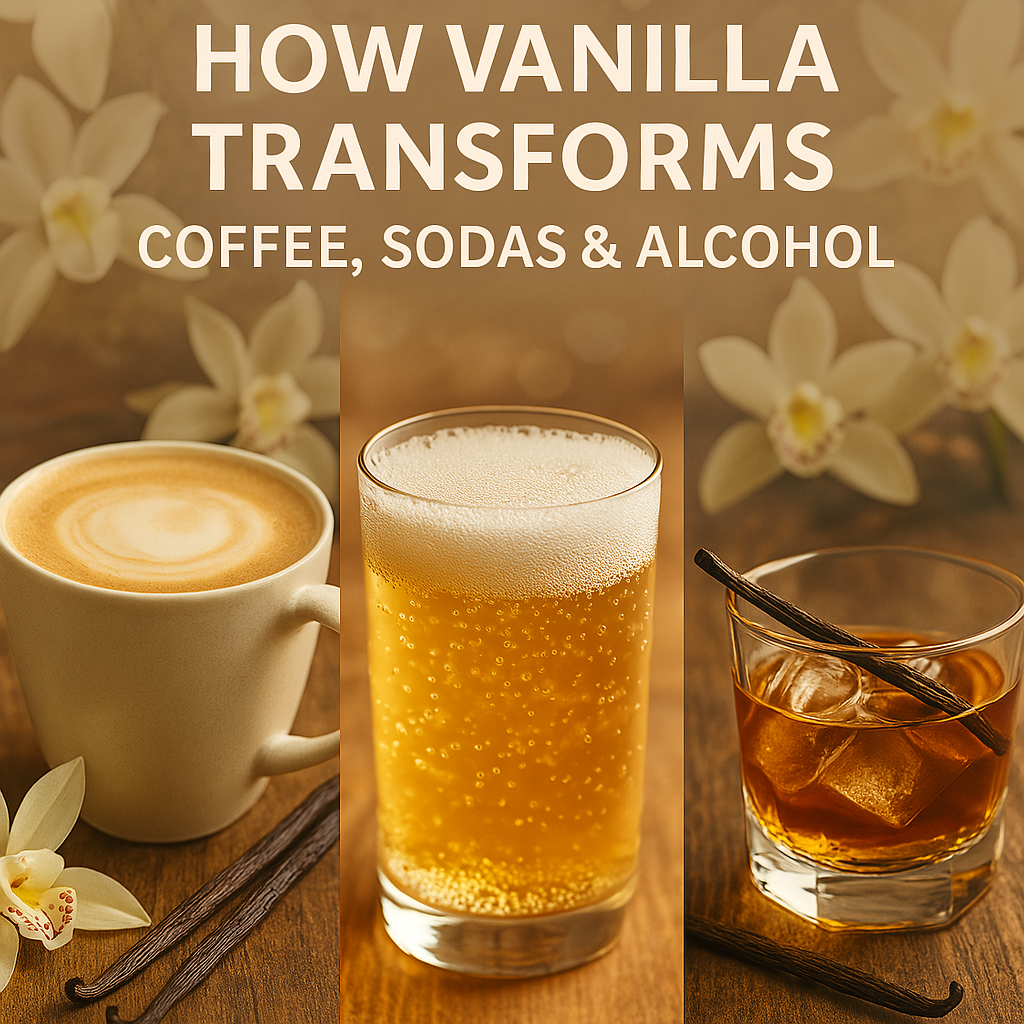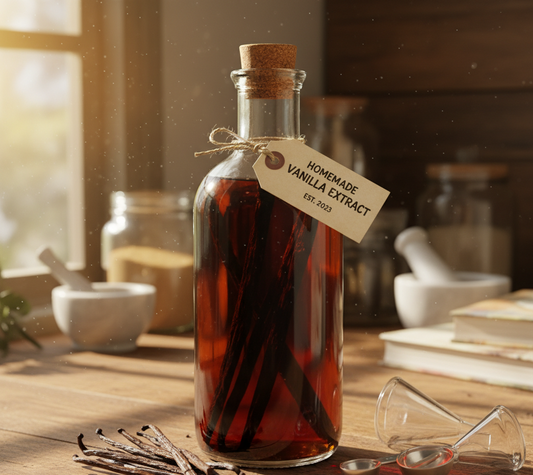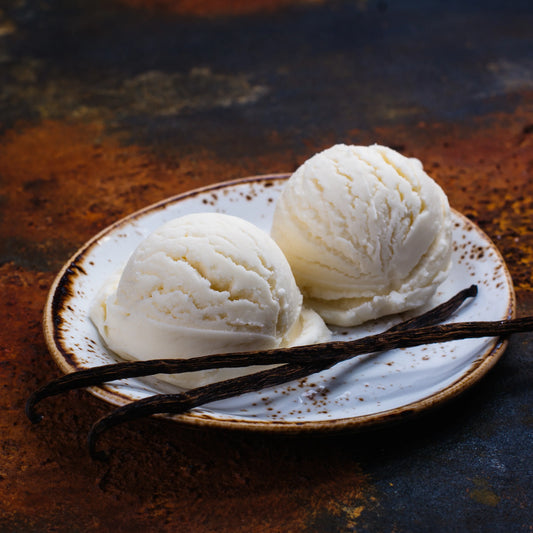
How Beverage Companies Use Vanilla in Coffee, Sodas, and Alcohol
Share
A common ingredient in baking, pastry, and cooking, vanilla is a household name. However, most people are unaware that vanilla plays a big part in the beverage business as well. Vanilla has emerged as a prominent flavor characteristic that enhances consumers' taste experiences in anything from coffee and soft drinks to alcoholic beverages.
For vanilla enthusiasts, manufacturers, suppliers, and distributors, discovering how this incredible ingredient is used in beverages can open doors to new business and innovation opportunities. In this blog post, we will explore how the beverage market uses vanilla in coffee, sodas, and spirits, why it is important, and how it contributes to the drinking experience.
1. Why Is Vanilla So Unique?
Let's talk about the unique qualities of vanilla before we get into how it's used in drinks.
The History of Vanilla:
· The orchid flower Vanilla planifolia, which is indigenous to Mexico and has been grown for generations, is the source of vanilla.
· Harvesting and curing vanilla is a time-consuming process, thus one of the most expensive spices in the world, but because of its rich flavor and aroma quality, it is highly demanded.
· Nature's complexity of vanilla encompasses sweet, floral, creamy, and sometimes smoky undertones, which make it very versatile in food and beverage applications.
Vanilla in the Beverage Market
Although it is most commonly linked to desserts, vanilla is also used extensively in beverages.
· Its soothing and smooth flavor improves the flavor of coffee, sodas, and liquors, making them more palatable and adding depth and complexity to the whole flavor.
2. Coffee with Vanilla: More Than Just a Flavor
Millions of people like drinking coffee, and most coffee drinks now contain vanilla. What role does vanilla play in the coffee-drinking experience?
What role does vanilla play in the coffee-drinking experience?
Coffees with vanilla flavors:
· Vanilla syrup, vanilla extracts, and even vanilla beans are frequently used to flavor coffee drinks;
· Coffee shops and specialty restaurants usually offer vanilla lattes, vanilla iced coffees, and flavor espresso drinks, all of which rely on vanilla to add sweetness and a smooth, creamy taste.
Coffee's Flavor Balance:
· Some customers may find coffee to be disagreeable due to its occasional bitterness and acidity.
· Vanilla is frequently added to add depth to coffee and acts as a taste balancer, softening the harsh edges of coffee beans and making the beverage more palatable.
· The earthy, strong flavor of coffee is beautifully complemented by its richness and creaminess.
Producing Vanilla Coffee Beverages
· To preserve the flavor purity of their drinks, coffee makers source premium vanilla. Vanilla can be added to coffee in a variety of ways, including syrups, extracts, or directly into the beans.
· The secret to preserving a high-quality product for many luxury businesses is to use real vanilla rather than artificial flavoring.
3. A Cool Twist: Vanilla in Sodas
How can the warm, creamy flavor of vanilla fit into the usually acidic and bubbly category of sodas, which are frequently sweet and carbonated? Let's see how vanilla functions in sodas.
Vanilla Soda History and Popularity:
· Vanilla has been used in sodas for decades, with classic drinks like root beer and cream soda featuring vanilla as a key flavor profile.
· Vanilla’s sweet and smooth taste blends perfectly with the carbonation in sodas, creating a refreshing and comforting drink.
Vanilla in Contemporary Soda Products:
· Vanilla-infused sodas are still widely consumed today, particularly in varieties like vanilla cream and vanilla cola.
· To give classic cola and root beer flavors a distinctive touch, beverage producers frequently add vanilla flavoring to their sodas. For customers seeking a more decadent Coke experience, vanilla offers an additional layer of sweetness.
How Vanilla Is Used in Sodas by Beverage Companies:
· Vanilla syrups, extracts, or artificial flavoring are typically used to add vanilla to sodas.
· Vanilla acts as a flavor enhancer, enhancing the soda's inherent sweetness and balancing out other components like caramel, cola, or root beer spices. • Manufacturers choose vanilla flavoring because it can endure the carbonation process while retaining its sweet, soothing taste.
4. Vanilla: A Tasty Supplement to Alcoholic Drinks
Additionally, vanilla has established itself in the alcoholic beverage industry by contributing sweetness and depth to a variety of spirits and cocktails.
Spirits (Whiskey, Vodka, Rum) containing vanilla:
· Certain alcoholic beverages, such as vodka, rum, and whiskey, are infused with vanilla. It gives ordinarily harsh or dry spirits a delicate, silky sweetness.
· For instance, whiskey or bourbon with vanilla added has grown in popularity as the vanilla improves the drink's depth and smoothness.
The Production of Alcoholic Drinks with Vanilla Infusions:
· In order to give the alcohol time to naturally blend with the spirit, vanilla is frequently added throughout the aging process. While some distillers use vanilla flavorings or extracts, others use actual vanilla beans.
· The brand's inclination for authenticity and financial reasons frequently influences the decision between real and fake vanilla.
5. How Vanilla Improves the Taste Profiles of Drinks
Vanilla's ability to enhance and balance other flavors is one of the main reasons it's utilized in so many different beverages. Vanilla enhances the flavor in the following ways:
Complementary Ingredients:
· Vanilla blends well with chocolate, caramel, and even spices like nutmeg and cinnamon in coffee.
· Vanilla balances the harshness of carbonation and spices, such in root beer, and adds sweetness to sodas.
· Vanilla enhances the flavors of fruits, spices, and herbs in alcoholic beverages, giving the finished product more depth and richness.
Vanilla as a Flavor Enhancer:
· Vanilla enhances other ingredients, bringing out their greatest qualities, rather than just making them stand out.
· The delicate yet potent flavor profile of vanilla makes it a crucial component for making well-balanced and well-rounded drinks. It also improves sweetness, smoothes out bitterness, and adds complexity to the entire beverage experience.
6. The Vanilla Supply Chain: Sustainability and Sourcing
It's crucial for beverage producers to source premium vanilla ethically and sustainably.
Purchasing Vanilla for Beverage Companies:
· Madagascar is the world's largest producer of vanilla, with Mexico and Tahiti coming in second and third, respectively.
· Sourcing vanilla for beverages involves attention to quality, sustainability, and ethical trade practices. High-quality vanilla can be pricey due to labor-intensive cultivation, harvesting, and curing operations.
The Distinction Between Artificial and Real Vanilla in Drinks:
· Companies that make beverages frequently have to choose between using artificial vanilla (vanillin) or real vanilla.
· Real vanilla is preferred by many luxury brands because it offers a fuller flavor experience, but it is also more expensive. Synthetic vanilla is less expensive, but it lacks the depth and complexity of real vanilla. Natural vanilla in beverages is growing in popularity as people grow more discriminating.
7. Trends and Difficulties in the Use of Vanilla in Drinks
Vanilla is a fantastic ingredient, but there are drawbacks to using it in drinks.
The price of vanilla can vary based on a number of factors, including weather, supply and demand, and the labor-intensive process of growing and curing vanilla beans. Vanilla is one of the most expensive spices.
As increasingly cost-effective substitutes for actual vanilla beans, beverage firms must adjust by utilizing vanilla extract or syrups.
The Future of Vanilla in Drinks:
· Trends indicate that consumers are increasingly choosing vanilla that is sourced ethically and organically. Customers who appreciate sustainability and transparency are paying increasing attention to beverage companies that prioritize ethical sourcing.
· In order to meet customers' increasing need for nuanced flavors, the craft soda and craft cocktail businesses are likewise embracing vanilla and launching novel and distinctive products.
In conclusion, vanilla's expanding significance in the beverage industry
Although its use in baking and cooking may be its most well-known use, vanilla has also become essential in the beverage industry. Vanilla improves the flavor characteristics of a wide range of beverages, including coffee, sodas, and alcohol, making them richer, smoother, and more decadent. Using real vanilla helps beverage firms meet the increasing demand for natural, authentic ingredients while also improving the quality of their goods. The future of vanilla in the beverage industry appears to be more promising than ever as the supply chain for the ingredient grows more sustainable and customers continue to favor distinctive and tasty beverages.


